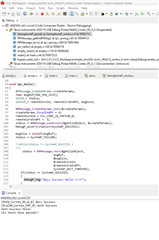Part Number: AM2432
Other Parts Discussed in Thread: SYSCONFIG
Hello TI,
This question is regarding the logical end points that can be created during IPC Communication.
As the documentation says, Users can create RPMessage_Object with local end value in the range of 0 .. RPMESSAGE_MAX_LOCAL_ENDPT - 1.
Can we create as many endpoints on a single core or does it need to be unique across the cores?
Because we want to establish an IPC communication between R5 and M4 and would like to differentiate the messages based on the endpoints for different protocols?
Thanks & regards
Teja



